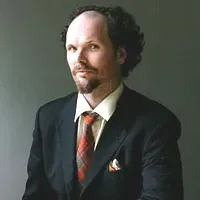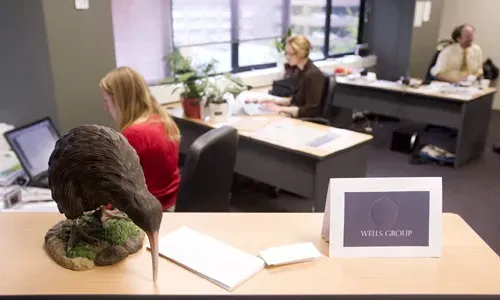Dissolving Work into Play
Written by

By Ron Hanson
Although it is against the principle of “democracy” for human bodies to be bought outright like objects, they are nonetheless given a numerical value, called a wage.
Brian Massumi - A User’s Guide to Capitalism and Schizophrenia
Tao Wells kicked up a vitriolic backlash of a storm in 2010 with his site-situated project The Beneficiary’s Office. Part of Letting Space, a series of temporary public artworks in Wellington occupying vacant commercial sites, Wells set up an office to publicise the virtues of unemployment.
Dressing as the hypermodern re-incarnation of Lenin, and locating his office on the sixth floor above a branch of the Australian-owned Bank of New Zealand, Wells strut an on odd character in the global landscape - jarring in his untimeliness.
Here he was taking public funding to start a workers’ movement to vacate work. Wells cast himself as an awkward marker of time inserted into the media-saturated environment. His two-person parade through the city on Labour Day, calling for the 16-hour work day, brought forward the ghosts of times gone by. It reminded that the streets were once filled with workers’ celebrations to mark the occasion. Wells pulled the emptiness of the streets into the foreground with his overly-exuberant gesture.
Staffed by five volunteers, The Beneficiary’s Office ignited a media firestorm of condemnation when it was falsely reported that Wells had received NZ$40,000 funding - actually the amount for the entire Letting Space series, with Wells getting a meagre NZ$3,500. The editorial of The Listener called it “puerile”. Roger Douglas, the architect of New Zealand’s 1980s neo-liberal reforms, said that Wells’ project raises the question of whether the Arts Council should even exist. The blogs sprayed out a steady stream of venom attacking Wells and beneficiaries in general, as the artist was maligned on television, the radio and in print. In response, Work and Income New Zealand cut Wells’ benefit but reinstated it after the artist appealed. Once the media had moved on, the department cut it again. Now Wells is a Benefit Rights Advocate but doesn’t receive the benefit himself.
Wells, for his part, got to describe work as “slavery” on national television and contribute an oped to conservative newspaper The Dominion Post, appearing as Lenin but quoting Joseph Beuys, “Let’s talk of a system that transforms all the social organisms into a work of art…” Claiming that the true artists of our times are the lobbyists and PR companies, who are creating the frame for how we view reality, Wells set up his own PR organisation, Wells Group, to publicise the idea that an advanced civilisation would actually be looking for ways to work and consume less.
Wells has previously made work concerning the unemployment benefit – bringing up its uncomfortable, even foundational, relationship with the arts in New Zealand – and perhaps it should be no surprise that he was eventually kicked off it. But it was unfortunate that the project couldn’t have stimulated more of a debate. Giovanni Tiso wrote that, if anything, Wells’ project revealed the limits of intellectual freedom in New Zealand.
“A one-sided backlash is not the same thing as a two-way conversation, and one struggles to name many individuals or institutions who stood up in support of Wells when he was most exposed and vulnerable. So where was the Left in all of this?
... Where were our public intellectuals and Wells’ fellow artists when he had his livelihood abruptly cut off in what must be one of the most blatant acts in recent memory of intimidation against a dissenter?”
The Beneficiary’s Office, and the punitive response it received, raises questions about the right to freedom of speech for beneficiaries and the limits of permissible artistic and political expression in New Zealand. Ultimately Wells was punished for representing a group that receives little representation, despite its growing numbers.
That someone should question the very nature of work at a time when the economy is in permanent crisis might seem to some oddly inappropriate. But what better time to explore the characteristics of work as a construction, as a category, as a value system, as a unit of measurement? Deleuze and Guattari describe ‘work’ as a capture of activity.
The amount of activity generated by Wells using a small arts grant was impressive. That it could not be completely captured is the source of its problems and potential.
